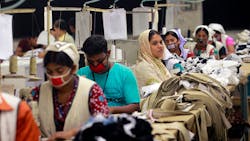Starting with a need to educate consumers to shop ethically, a new study, the 2015 Australian Fashion Report, graded companies based on their policies, supply chain traceability, monitoring programs and worker rights.
“It doesn’t take much for the end-consumer to make a difference to the lives of those making our clothes,” said Gershon Nimbalker, advocacy manager at Baptist World Aid, the group that conducted the research.
However, over 85% of companies are not paying their workers enough to meet basic needs
Taking Bangladesh as an example research showed than an additional 30c per t-shirt would ensure living wages are met in Bangladesh, said Nimbalker. The report showed that almost two years since the 2013 Rana Plaza factory collapse in Bangladesh, which saw over 1,100 workers lose their lives, a new Australian fashion industry report reveals that fashion brands aren’t doing enough to protect workers in their international supply chains.
While many companies studied have not improved, both Kmart and Cotton On have improved their traceability of suppliers throughout their supply chains and Country Road and the Susan Group have improved worker wages.
“It’s really encouraging to see companies make high impact and lasting changes like publishing lists of direct suppliers” said Nimbalker.
Highlights of the report include:
- Policies: 71% of companies have a code of conduct that covers core International Labor Organisation principles.
- Transparency & Traceability: 52% of companies have fully traced their final stage manufacturers, but only 9% have fully traced down to raw materials.
- Monitoring & Training: 75% of companies use some kind of external monitoring system. Only 10% of companies regularly conduct monitoring audits unannounced and consult workers.
- Worker Rights: Only 14% of companies are paying some form of living wage and only 34% of companies have a functioning grievance mechanism for overseas workers.
The researchers hope by reporting this information consumer will use it to make every day ethical purchasing decisions “because we know that when consumers call for change, they have the power to transform the practices of companies,” said Nimbalker.
